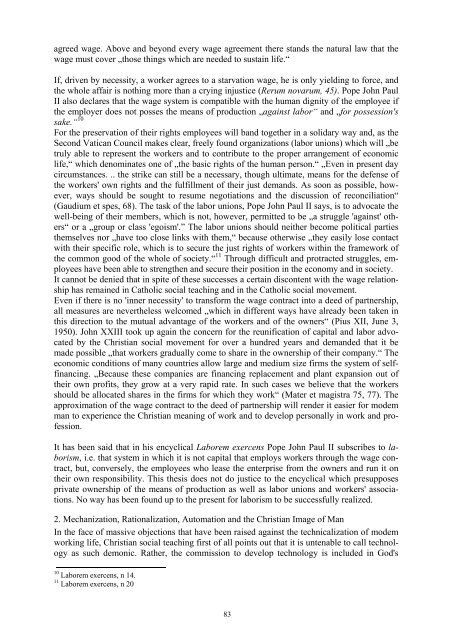Joseph Cardinal Höffner CHRISTIAN SOCIAL ... - Ordo Socialis
Joseph Cardinal Höffner CHRISTIAN SOCIAL ... - Ordo Socialis
Joseph Cardinal Höffner CHRISTIAN SOCIAL ... - Ordo Socialis
You also want an ePaper? Increase the reach of your titles
YUMPU automatically turns print PDFs into web optimized ePapers that Google loves.
agreed wage. Above and beyond every wage agreement there stands the natural law that the<br />
wage must cover „those things which are needed to sustain life.“<br />
If, driven by necessity, a worker agrees to a starvation wage, he is only yielding to force, and<br />
the whole affair is nothing more than a crying injustice (Rerum novarum, 45). Pope John Paul<br />
II also declares that the wage system is compatible with the human dignity of the employee if<br />
the employer does not posses the means of production „against labor“ and „for possession's<br />
sake.“ 10<br />
For the preservation of their rights employees will band together in a solidary way and, as the<br />
Second Vatican Council makes clear, freely found organizations (labor unions) which will „be<br />
truly able to represent the workers and to contribute to the proper arrangement of economic<br />
life,“ which denominates one of „the basic rights of the human person.“ „Even in present day<br />
circumstances. .. the strike can still be a necessary, though ultimate, means for the defense of<br />
the workers' own rights and the fulfillment of their just demands. As soon as possible, however,<br />
ways should be sought to resume negotiations and the discussion of reconciliation“<br />
(Gaudium et spes, 68). The task of the labor unions, Pope John Paul II says, is to advocate the<br />
well-being of their members, which is not, however, permitted to be „a struggle 'against' others“<br />
or a „group or class 'egoism'.” The labor unions should neither become political parties<br />
themselves nor „have too close links with them,“ because otherwise „they easily lose contact<br />
with their specific role, which is to secure the just rights of workers within the framework of<br />
the common good of the whole of society.“ 11 Through difficult and protracted struggles, employees<br />
have been able to strengthen and secure their position in the economy and in society.<br />
It cannot be denied that in spite of these successes a certain discontent with the wage relationship<br />
has remained in Catholic social teaching and in the Catholic social movement.<br />
Even if there is no 'inner necessity' to transform the wage contract into a deed of partnership,<br />
all measures are nevertheless welcomed „which in different ways have already been taken in<br />
this direction to the mutual advantage of the workers and of the owners“ (Pius XII, June 3,<br />
1950). John XXIII took up again the concern for the reunification of capital and labor advocated<br />
by the Christian social movement for over a hundred years and demanded that it be<br />
made possible „that workers gradually come to share in the ownership of their company.“ The<br />
economic conditions of many countries allow large and medium size firms the system of selffinancing.<br />
„Because these companies are financing replacement and plant expansion out of<br />
their own profits, they grow at a very rapid rate. In such cases we believe that the workers<br />
should be allocated shares in the firms for which they work“ (Mater et magistra 75, 77). The<br />
approximation of the wage contract to the deed of partnership will render it easier for modem<br />
man to experience the Christian meaning of work and to develop personally in work and profession.<br />
It has been said that in his encyclical Laborem exercens Pope John Paul II subscribes to laborism,<br />
i.e. that system in which it is not capital that employs workers through the wage contract,<br />
but, conversely, the employees who lease the enterprise from the owners and run it on<br />
their own responsibility. This thesis does not do justice to the encyclical which presupposes<br />
private ownership of the means of production as well as labor unions and workers' associations.<br />
No way has been found up to the present for laborism to be successfully realized.<br />
2. Mechanization, Rationalization, Automation and the Christian Image of Man<br />
In the face of massive objections that have been raised against the technicalization of modem<br />
working life, Christian social teaching first of all points out that it is untenable to call technology<br />
as such demonic. Rather, the commission to develop technology is included in God's<br />
10 Laborem exercens, n 14.<br />
11 Laborem exercens, n 20<br />
83















